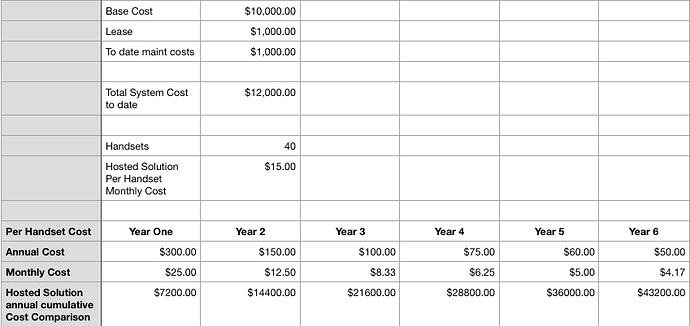I don’t get the value proposition for hosted PBX solutions where there’s a monthly fee per phone. I know the arguments, but it seems like a pretty big extravagence to me. Perhaps I’m just too cheap 
I’m not saying this is the solution for everyone and if you are using a hosted solution and it makes sense for you - great! I’m not here to tell anyone they are dumb and should switch to “my way” - I present the below as an alternative point of view, and I’m thinking not so much about others who have posted in this thread per se, but folks who will likely come across this thread later. Hopefully that will quell any feelings that this post needs a rebuttal  Discussions are always welcome - crusades not so much (and I’ve done my share of crusading too
Discussions are always welcome - crusades not so much (and I’ve done my share of crusading too  )
)
We paid about $10K for an Allworx VOIP system with 40 phones and it supports five analog lines. It can handle six without needing more parts but we only needed five. We started with analog trunks because Internet wasn’t the most reliable when we got the system and it has worked well, is the same cost as digital SIP trunks and I see no reason to mess with something that’s working. The initial system cost including integration support and setup, a couple of POE switches and a UPS we could dedicate to the phone processor and the POE switches to keep everything up in a power outage. Myself and a couple other members (two who work for the phone company) pulled out the old KSU system we had and moved the server room cable terminations from the 66 blocks the KSU used to CAT 5 panels we needed for the VOIP phones. Thankfully the building was new enough that all wiring was CAT5 and terminated properly in the offices/classrooms so the only re-wiring we had to do was in the server room. The Allworx system came pre-configured (getting a good integrator is key!); we unboxed everything, mounted/distributed the pieces of the system and spent less than an hour with our integrator (who was remote) testing and validating the config. There were a few tweaks but it was up in less than half a day. While the Allworx web admin screens aren’t what I would call overly user friendly, they are way better than the KSU systems and reasonable enough that our admin staff manage extension and name changes with no problems since the system was installed. It’s certainly better than making admin changes through powershell (!!)
There is about another $1K for the cost of three year lease that’s now a distant memory (was probably less but I’ll estimate high) and we have had to have some ancillary support from time to time when we couldn’t figure something out on our own, so I’ll be generous and say $1K for that to just to be conservative.
All of the above costs look like the below if you take the overall system cost (TCO for those so inclined), divide it by the number of handsets and then as you spread those costs out over the years you can really see that fixed cost drop over time:
Right off the bat in year one I’m well within the other solutions and it gets dramatically better as the years go on. We are almost into year 7 right now and the system still just chugs right along - the money we would have spent in hosted solutions goes to other ministry needs.
Then again I could be off my rocker and completely missed something in my analysis - if so feel free to point out the fallacy of any or all of my assumptions 
Users love the physical phones. We have a few softphone licenses for people who want them, but the only time we ever used them was when people were on missions out of the country - again they worked great as long as Internet in the remote regions was passable (of course).
So many people are going the per line hosted route it feels like there has to be something obvious I’m missing. Maybe they just don’t have handsets in common areas? That doesn’t seem smart to me - yes, a lot of people have cell phones but having a hardwired phone nearby for emergency - life/safety/health - seems like a mandatory requirement to me. Phone batteries die, coverage can wax/wane. If I’m having a heart attack I want to get to a phone for help pretty quick and as much as possible be assured it’s going to work without worrying about batteries or coverage. Call me old fashioned.
Indeed, that was a huge driver for replacing the KSU system (other than we couldn’t maintain the KSU system - every change required a service call) - there were only phones in the offices and none elsewhere in the building and we did have a medical emergency in the children’s classrooms and getting help via cell phone was an issue (911 is far from perfect with mobile phones, even today).


 Discussions are always welcome - crusades not so much (and I’ve done my share of crusading too
Discussions are always welcome - crusades not so much (and I’ve done my share of crusading too  )
)